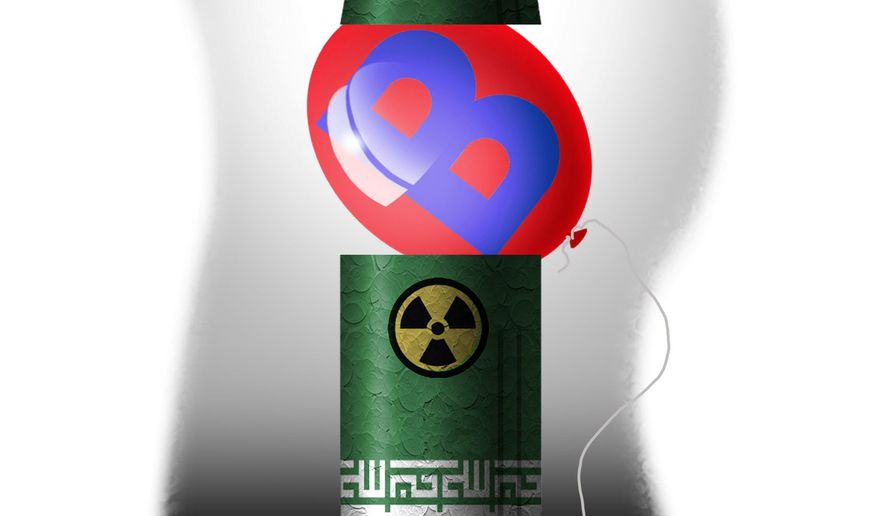OPINION:
Last month, President Biden convened the first-ever summit for democracy, calling the defense of democracy “the defining challenge of our time.” At the summit, leaders of 100 nations committed to advancing democracy and promoting human rights. These commitments stand in stark contrast with the goal of restoring the fatally flawed 2015 nuclear agreement that the Obama administration struck with Iran.
The windfall of cash paid to the religious dictatorship in exchange for near-Potemkin constraints on Iran’s nuclear program was used to bring the murderous Assad regime in Syria close to near-total victory, to provide resources to terrorist proxies and to suppress the people of Iran through brutal repression, including the mass killings in November 2019.
The second windfall that the regime would receive from lifting current sanctions would be employed for the same purposes. Apparently, promoting democracy and human rights is a lesser priority than restoring the fatally flawed nuclear agreement that, given the sunset provisions, is even less meaningful than it was six years ago.
If an agreement is reached, the value of any short-term constraints will be far outweighed by making clear to Russian President Vladimir Putin, Chinese President Xi Jinping and the mullahs in Tehran that the call to promote democracy and human rights is nothing more than empty rhetoric.
Despite the purposeful humiliation of the American negotiators by Iran’s insistence that they do not have a seat at the table, Mr. Biden remains firmly committed to restoring an agreement that has demonstrably failed to achieve its stated goal of closing the pathways for Iran to build a nuclear weapon.
This became apparent when Iran quickly resumed enriching uranium beyond the permitted level, now up to 60%. Other actions prohibited under the agreement, such as manufacturing uranium metal (whose only purpose is for a weapon), have shown that Tehran was preparing for a breakout while still under the agreement.
Meanwhile, Tehran continues to demand the lifting of all economic sanctions at once — including sanctions related to terrorism and human rights abuses — before the regime will even discuss resuming its compliance with the deal. While the Biden administration has refused this demand so far and has even imposed new sanctions, it appears willing, even enthusiastic, to pay a high price for the restoration of the agreement. The administration has warned that other options are on the table, but it has taken no concrete steps to increase pressure on Iran.
That inaction leaves open the possibility that Mr. Biden will still hand over the resources that Tehran needs to accelerate its nuclear and missile programs, as well as to pursue its aggression against U.S. Gulf allies. Repression of the Iranian people is also certain to continue, as the regime has been noticeably struggling to retain its hold on power in the wake of multiple recent uprisings and large-scale expressions of political dissent.
The Iranian regime desperately wants its foreign adversaries to focus on the nuclear negotiations rather than the Islamic Republic’s internal vulnerabilities. So far, the U.S. and other western countries have been indulging that desire, and if they continue to do so, they will provide Iran’s theocratic leaders with a vital lifeline by compounding the clear mistakes they made in 2015.
At that time, the nuclear agreement was portrayed to engineer positive change inside Iran by strengthening the so-called moderate faction headed by then-President Hassan Rouhani. But to the surprise of no one familiar with the internal workings of the regime, this hope for moderation proved to be an illusion. The selection in August of Ebrahim Raisi as president, a prominent member of the death commission responsible for the murder of over 30,000 political prisoners in the 1980s, shows how desperately wrong the Obama administration was.
The Biden administration has suggested that this will not happen again because restoration of the nuclear accord is only the first step toward a broader agreement that will address those issues which were not addressed in 2015. But such promises are either naïve or intentionally misleading. We all know that when sanctions are lifted as a condition of rejoining the agreement, it will be the last step, not the first step.
The U.S. will have again paid a high price for a bad deal — a price that includes more missiles, more aggression, more repression and no significant constraints on the regime’s nuclear program.
• Robert Joseph is a former U.S. Under Secretary of State for Arms Control and International Security.




Please read our comment policy before commenting.